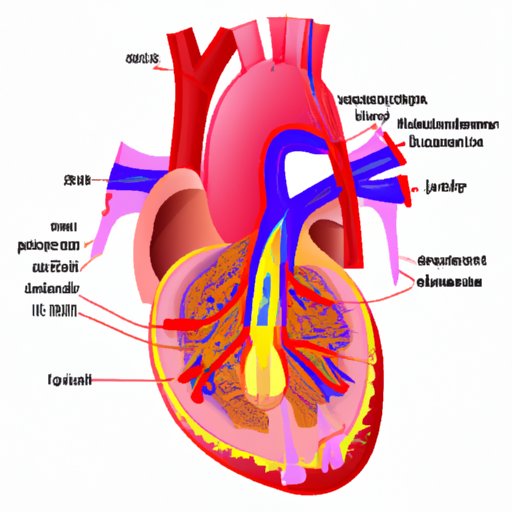Introduction
Have you ever wondered how much blood is circulating throughout your body at any given moment? Blood is an essential component of the human body, with an average adult having between 4-5 liters of blood at any given time. Understanding blood volume is crucial for maintaining our overall health and well-being. In this article, we will explore the important role of blood volume in the human body and how it affects our health.
Facts and Figures: Understanding the Human Body’s Blood Volume
Blood is a complex bodily fluid that consists of various components, including red and white blood cells, plasma, and platelets. Its primary function is to transport oxygen and nutrients to the body’s tissues while removing waste products. Blood volume is typically measured in liters and can vary depending on age, gender, and other factors. For example, the average range for adults is between 4-5 liters, with men having slightly more blood volume than women.
The Importance of Blood Volume: How Many Liters Does the Human Body Hold?
Blood volume plays a vital role in our overall health and well-being. Maintaining healthy blood volume helps ensure that our body’s tissues receive adequate oxygen and nutrients, which can help prevent various health conditions. Factors such as age, gender, and overall health can affect blood volume. As we age, our blood volume tends to decrease, and women usually have a lower blood volume than men. Medical conditions, such as anemia or dehydration, can also affect blood volume.
Blood by the Liter: Breaking Down the Human Body’s Circulatory System
The human circulatory system is responsible for transporting blood throughout the body. It consists of the heart, blood vessels, and blood. The heart pumps blood throughout the body, while blood vessels, such as arteries and veins, help transport blood to and from the heart. Arteries transport oxygenated blood away from the heart, while veins transport deoxygenated blood back to the heart. Capillaries are tiny blood vessels that connect arteries and veins, allowing for the exchange of oxygen, nutrients, and waste between the blood and body tissues.
The Science Behind Blood Volume in the Human Body: Exploring the Numbers
Our body regulates blood volume through a complex system that involves the kidneys and hormones. The kidneys play an essential role in controlling blood volume by filtering and removing excess fluids from the body. Hormones, such as antidiuretic hormone (ADH) and aldosterone, also help regulate blood volume by controlling the amount of fluid and sodium in the body. Having too little or too much blood volume can lead to health issues, such as low blood pressure or edema.
From Heart to Veins: Tracing the Journey of Blood in the Human Body
Blood is constantly circulating throughout our bodies, carrying vital nutrients and oxygen to our organs and tissues. The journey begins with the heart, which pumps blood throughout the body via the circulatory system. Blood travels from the heart to the arteries, where it begins to transport oxygen and nutrients to the body’s tissues. From there, the blood travels through capillaries, where oxygen and nutrients are exchanged with the body’s tissues. Finally, the blood travels back to the heart through veins, where it is pumped to the lungs to be oxygenated.
Blood Volume and Your Health: Why it Matters and What You Can Do to Maintain It
Maintaining healthy blood volume is essential for good health. Doing so helps ensure that our body tissues receive adequate oxygen and nutrients, which can help prevent various health conditions. Drinking plenty of water and eating a balanced diet can help maintain healthy blood volume. If you have a medical condition that affects blood volume, making lifestyle changes, such as avoiding alcohol and caffeine, staying hydrated, and taking recommended medications, can help maintain healthy blood volume levels.
Conclusion
Blood volume plays a crucial role in our overall health and well-being. By understanding how our body regulates blood volume and the role it plays in our circulatory system, we can take steps to maintain healthy blood volume levels. If you have concerns about blood volume or your overall health, be sure to discuss them with your healthcare provider.
